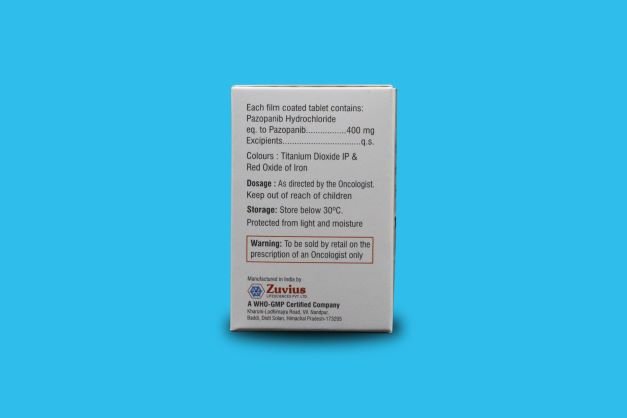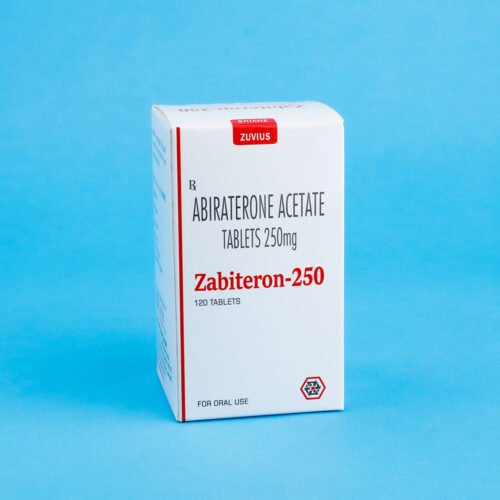Zupanib Tab-Pazopanib Tab
Pazopanib Tab
Strength: 200mg / 400mg
Pack Size: 1 x 30
Drug Class: Tyrosine kinase inhibitors
Dosage and Administration:
Recommended Dosage
The recommended dosage of Zupanib is 200mg / 400mg orally once daily without food (at least 1 hour before or 2 hours after a meal) until disease progression or unacceptable toxicity
The dosage should be modified for hepatic impairment and in patients taking certain concomitant drugs .
Swallow tablets whole. Do not crush tablets due to the potential for increased rate of absorption, which may affect systemic exposure
If a dose is missed, it should not be taken if it is < 12 hours until the next dose.
Cold Storage: no
Zupanib Tab(pazopanib) is a tyrosine kinase inhibitor (TKI). Pazopanib is presented as the hydrochloride salt, with the chemical name 5-[[4-[(2,3-dimethyl-2H-indazol-6-yl)methylamino]-2- pyrimidinyl]amino]-2-methylbenzenesulfonamide monohydrochloride. It has the molecular formula C21H23N7O2S•HCl and a molecular weight of 473.99. Pazopanib hydrochloride has the following chemical structure:
 |
Pazopanib hydrochloride is a white to slightly yellow solid. It is very slightly soluble at pH 1 and practically insoluble above pH 4 in aqueous media.
Tablets of Zupanib Tab are for oral administration. Each 200-mg tablet of VOTRIENT contains 216.7 mg of pazopanib hydrochloride, equivalent to 200 mg of pazopanib free base.
Renal Cell Carcinoma
Zupanib is indicated for the treatment of adults with advanced renal cell carcinoma (RCC).
Soft Tissue Sarcoma
Zupanib is indicated for the treatment of adults with advanced soft tissue sarcoma (STS) who have received prior chemotherapy.
Limitations Of Use
The efficacy of Zupanib for the treatment of patients with adipocytic STS or gastrointestinal stromal tumors has not been demonstrated.
Usage-:
Pazopanib is a cancer medicine that is used to treat patients with kidney cancer (advanced renal cell carcinoma). It is also used to treat advanced soft tissue sarcoma (STS) in patients who have received other cancer treatments.
Pazopanib is a multi-tyrosine kinase inhibitor of vascular endothelial growth factor receptor (VEGFR)-1, VEGFR-2, VEGFR-3, platelet-derived growth factor receptor (PDGFR)-α and -β, fibroblast growth factor receptor (FGFR)-1 and -3, cytokine receptor (Kit), interleukin-2 receptor-inducible T-cell kinase (Itk), lymphocyte-specific protein tyrosine kinase (Lck), and transmembrane glycoprotein receptor tyrosine kinase (c-Fms).
In vitro, pazopanib inhibited ligand-induced autophosphorylation of VEGFR-2, Kit, and PDGFR-β receptors.
In vivo, pazopanib inhibited VEGF-induced VEGFR-2 phosphorylation in mouse lungs, angiogenesis in a mouse model, and the growth of some human tumor xenografts in mice.
if you are allergic to pazopanib or any of the other ingredients.
Tell your doctor if you have or have ever had liver disease. If you experience any of the following symptoms, call your doctor immediately: yellowing of the skin or eyes; dark urine; extreme tiredness; nausea; vomiting; loss of appetite; pain in the upper right part of the stomach; or unusual bleeding or bruising.
if you have heart disease.
– if you have liver disease.
– if you have had heart failure or a heart attack.
– if you have had prior collapse of a lung.
– if you have had problems with bleeding, blood clots or narrowing of the arteries.
– if you have had stomach or bowel problems such as perforation (hole) or fistula (abnormal passages forming between parts of the intestine).
– if you have thyroid problems.
– if you have problems with your kidney function.
– if you have or have had an aneurysm (enlargement and weakening of a blood vessel wall)









